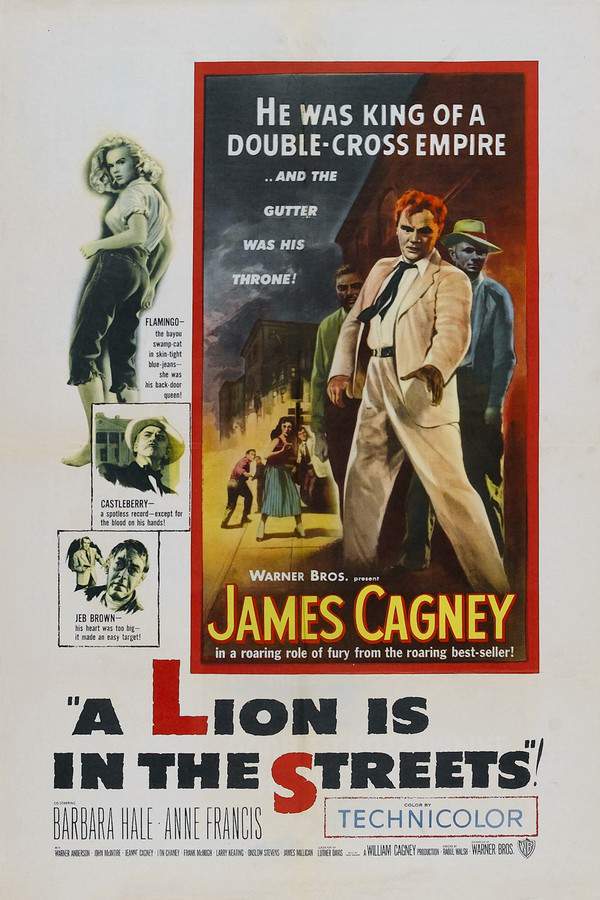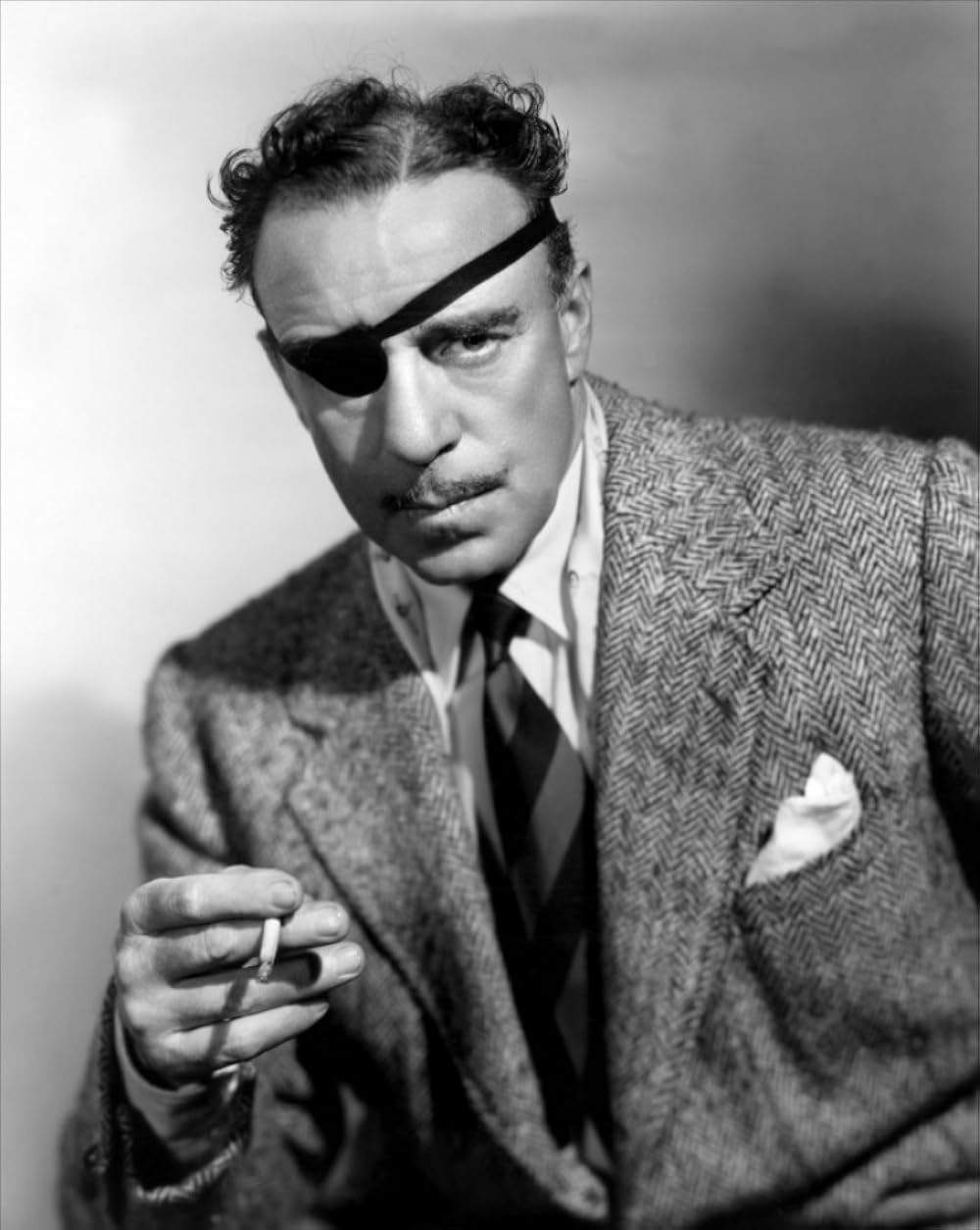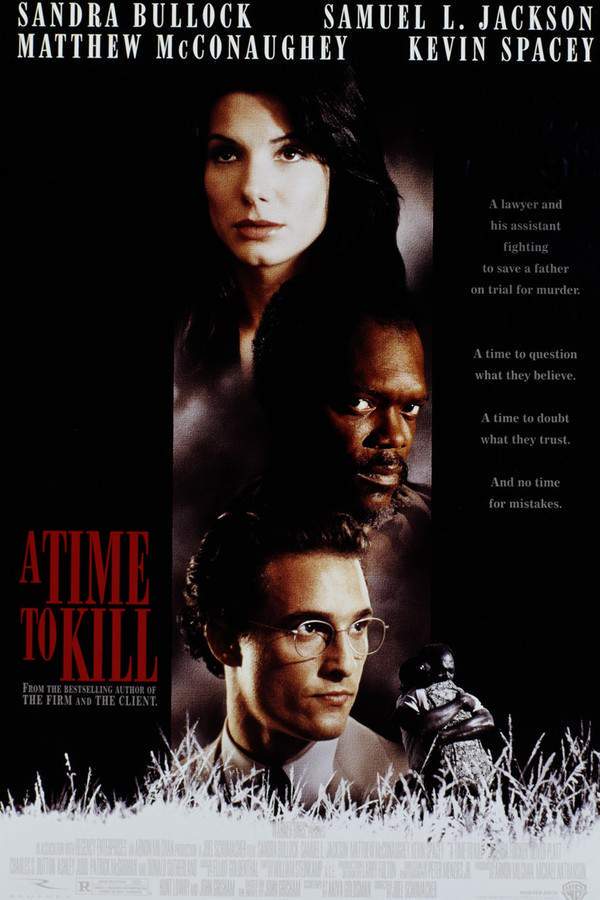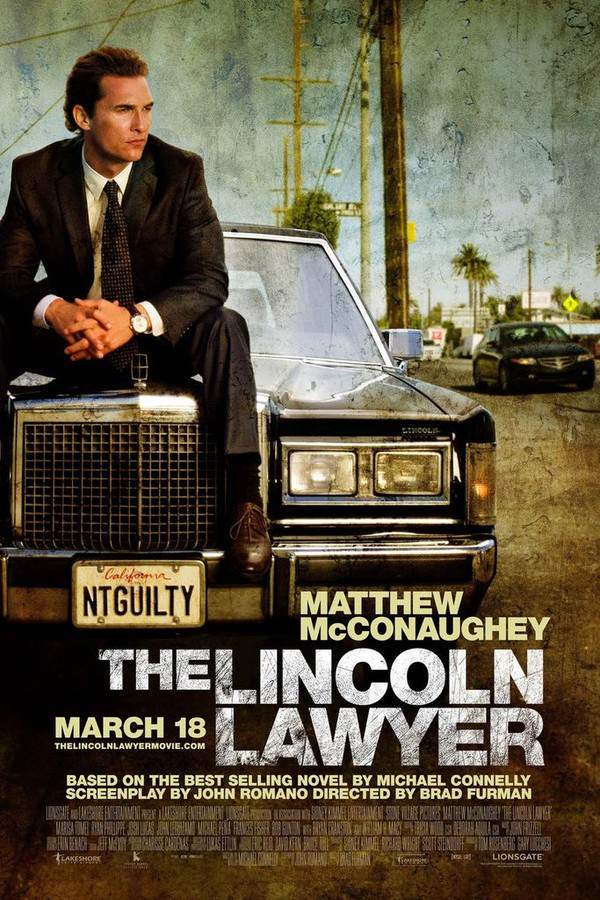
A Lion Is in the Streets 1953
Directed by

Raoul Walsh
Made by

Warner Bros.
Test your knowledge of A Lion Is in the Streets with our quiz!
A Lion Is in the Streets Plot Summary
Read the complete plot summary and ending explained for A Lion Is in the Streets (1953). From turning points to emotional moments, uncover what really happened and why it matters.
As the charming peddler Hank Martin entered a new chapter of his life by marrying schoolteacher Verity Wade, little did she know the depths of complexity that lay beneath his charismatic facade. On a sunlit day, they exchanged vows amidst celebration, culminating in the acquisition of a dilapidated house from the esteemed lawyer Jules Bolduc. As Hank and his array of friends set to work repairing their new home, Verity started to unearth her husband’s true personality, one thrill-seeking heart that thrived on manipulation.
Later that evening, Jules invited the newlyweds to dinner, where Hank’s temper flared over the presence of Robert L. Castleberry IV, a cotton magnate embroiled in controversy for exploiting vulnerable farmers. Tensions escalated quickly, and Hank, fueled by a fierce passion for justice, confronted Castleberry, condemning him vocally for his selfish deeds.
Driven to reveal Castleberry’s deception, Hank, alongside Verity, journeyed to the bayou, where they met Flamingo, a young woman who had long harbored feelings for the peddler. But upon discovering Hank’s matrimonial status, Flamingo’s affections morphed into vindictiveness, culminating in a perilous alligator attack that left Verity injured yet unharmed. Flamingo’s unyielding desire did not falter, as she relentlessly pursued Hank across the region.
As Hank’s battle against Castleberry intensified, he uncovered more evidence of the cotton baron’s treachery. When a follower fell victim to Castleberry’s violent henchmen, Hank was resolute in seeking justice. Unfortunately, Castleberry employed his influence to delay the trial of Jeb Brown. As Guy Polli, a dubious figure, offered his resources in exchange for Hank’s loyalty, a darker plot was afoot.
When Samuel T. Beach, Castleberry’s unyielding manager, executed Brown, Hank implored the dying man to stand firm in his testimony against Castleberry. Despite Brown succumbing to his injuries, Hank took advantage of the situation, urging the jury to declare a posthumous verdict of innocence before the judge could unveil the harsh truths to the public.
As the aftermath spiraled, threatening to dismantle Castleberry’s empire, Polli’s ulterior motives were revealed—his managers were the true architects of the malevolence. With a chance for Hank to bid for governorship on the horizon, disaster struck when a fierce rainstorm on election eve crippled rural voter turnout. In a desperate bid, Hank turned to Polli, who could enhance his vote count from city precincts but under the condition of Hank swearing to a misleading affidavit regarding Beach’s presence during Brown’s unfortunate demise—an agreement that carried severe repercussions for Castleberry’s interests.
With both candidates neck and neck in county victories, a deadlock ensued, only resolvable through the state assembly. Instead of awaiting his next chance, Hank rallied his supporters for an armed march on the capital—a move that sparked fear throughout the community.
While this tumult unfolded, Jules arrived with irrefutable evidence proving Beach’s role in Brown’s death, revealing that Hank had knowingly exchanged integrity for Polli’s gain. In an even more dramatic twist, Verity would come forth to authenticate Hank’s alibi, stating he had been with her during the crime. The crescendo reached a climax when Brown’s widow aimed her weapon at Hank, delivering a fateful shot as he faced his demise. In his final moments, Hank acknowledged the wisdom of his supporters, recognizing they saw through his deceptive pursuits far better than he had anticipated.
A Lion Is in the Streets Timeline
Follow the complete movie timeline of A Lion Is in the Streets (1953) with every major event in chronological order. Great for understanding complex plots and story progression.
Hank and Verity's Wedding
Hank Martin, a charming peddler, married schoolteacher Verity Wade on a sunny day filled with celebration. The couple exchanged vows, marking the beginning of their life together amidst hopeful beginnings.
Acquisition of the House
Following their wedding, Hank and Verity acquired a dilapidated house from esteemed lawyer Jules Bolduc. As they ventured into home repairs, Verity began to suspect that her husband's charm masked a more complex personality.
Dinner with Jules
That evening, Hank and Verity attended a dinner hosted by Jules. Tensions escalated when Hank's temper flared against cotton magnate Robert L. Castleberry IV, igniting a confrontation over Castleberry's controversial actions against farmers.
Journey to the Bayou
Determined to unveil Castleberry's deceit, Hank and Verity journeyed to the bayou. There, they encountered Flamingo, an admirer of Hank, whose feelings quickly turned to malice upon learning of his marriage.
The Alligator Attack
Flamingo's envy prompted her to unleash a dangerous alligator attack. Although Verity was injured, she managed to survive, highlighting the threats of jealousy that engulfed Hank's life.
Hank's Pursuit for Justice
As Hank's determination to expose Castleberry heightened, he discovered further evidence of the magnate's treachery. In the midst of battle, a follower fell victim to Castleberry's violent henchmen, which intensified Hank's quest for justice.
Trial Delays
Hank faced a setback when Castleberry leveraged his influence to stall the trial of Jeb Brown, a key witness against him. Desperate to rally support, Hank encountered Guy Polli, who offered shady resources for his loyalty.
Brown's Execution
In a cruel twist, Samuel T. Beach, Castleberry's manager, executed Jeb Brown. In his dying moments, Hank pleaded with Brown to maintain his testimony, signaling the desperation of their fight against corruption.
Posthumous Verdict
Following Brown's death, Hank capitalized on the chaos, urging the jury to deliver a posthumous verdict of innocence. The courtroom drama heightened as the public began to learn the truths intertwined with their battle.
Election Eve Disaster
As Hank pursued political aspirations, a fierce rainstorm on election eve crippled voter turnout in rural areas. In a desperate gamble, he sought Polli's help to manipulate votes, which threatened his integrity.
Armed March on the Capital
Amid a neck-and-neck electoral race, Hank rallied his supporters for an armed march on the capital. This bold move instigated widespread fear in the community and further complicated his already tumultuous path.
Jules' Revelation
As uncertainties flourished, Jules emerged with undeniable evidence against Beach, exposing Hank's dealings with Polli. The revelation threatened to unravel everything Hank had fought for and tested his moral compass.
Verity's Testimony
In a surprising turn, Verity stepped forward to authenticate Hank's alibi, claiming he had been with her during the crimes. Her testimony created a rift between Hank's ambitions and their marital faith.
Brown's Widow's Revenge
The climax reached its peak when Brown's widow aimed her weapon at Hank, delivering a fateful shot in the heat of the moment. In his final breaths, Hank confronted the consequences of his deceitful pursuits.
Hank's Realization
As Hank faced his demise, he came to the painful realization that his supporters had seen through his manipulation far more clearly than he had imagined. This acknowledgment marked the tragic end to his tumultuous journey.
A Lion Is in the Streets Characters
Explore all characters from A Lion Is in the Streets (1953). Get detailed profiles with their roles, arcs, and key relationships explained.
Hank Martin
Hank is a charismatic yet morally ambiguous peddler whose ambition blinds him to the ethical implications of his actions. Initially portrayed as charming, his true personality reveals a thrill-seeker prone to manipulation and deceit. Throughout the film, Hank's internal conflict between ambition and integrity drives his character arc.
Verity Wade
Verity is a schoolteacher and Hank's wife, who embodies patience and moral clarity as she navigates Hank's complex persona. While initially enamored by Hank's charm, she gradually uncovers the layers of manipulation and the darker sides of his ambition. Verity serves as a moral compass in the story, challenging Hank to confront his choices.
Castleberry
Robert L. Castleberry IV is a powerful cotton magnate who exploits the vulnerable while maintaining a polished public persona. His actions spark conflict with Hank, revealing the darker side of wealth and influence. Castleberry embodies the corrupting force of unchecked ambition, serving as the main antagonist in Hank’s quest for justice.
Flamingo
Flamingo is a young woman from the bayou who initially harbors romantic feelings for Hank. However, upon learning of his marriage, her affection turns to resentment, prompting her to challenge him. She represents the emotional turmoil surrounding Hank's relationships and the complexities of love and jealousy.
Jules Bolduc
Jules Bolduc is the esteemed lawyer who facilitates Hank and Verity's purchase of their home, serving as a pivotal figure in their new life. His charisma and connections contrast with the darker realities of the story, emphasizing the blend of respectability and corruption within the community.
A Lion Is in the Streets Settings
Learn where and when A Lion Is in the Streets (1953) takes place. Explore the film’s settings, era, and how they shape the narrative.
Time period
Mid-20th Century
Set in the mid-20th century, this period saw significant social and political upheaval in the United States. It was marked by civil rights movements and a growing awareness of social justice issues, reflected in Hank's confrontations with powerful figures. The era's complexities are embodied through Hank's journey as he navigates ambition and morality amidst a rapidly changing landscape.
Location
Bayou, Rural Community, Capital City
The bayou is a lush, swampy area known for its diverse ecosystem and vibrant wildlife, including alligators. It serves as a backdrop for Hank's confrontation with Flamingo and an escape from the chaos of his life. The rural community represents small-town struggles, where characters collide over power and justice. Meanwhile, the capital city epitomizes political ambition and the battleground for Hank's aspirations.
A Lion Is in the Streets Themes
Discover the main themes in A Lion Is in the Streets (1953). Analyze the deeper meanings, emotional layers, and social commentary behind the film.
⚖️
Justice
The pursuit of justice permeates the narrative as Hank seeks to expose corruption and fight for the vulnerable. His journey highlights the moral dilemmas faced when personal ambition clashes with ethical responsibilities. This theme explores the consequences of one's choices and the fine line between right and wrong in a corrupt society.
💔
Deception
Deception plays a central role, particularly through Hank's manipulative traits and the relationships he navigates. His charm masks darker motivations, leading to strained connections with those around him. The film intricately examines how lies can ensnare and ultimately destroy both the deceiver and the deceived.
🌧️
Ambition
Ambition is a driving force for Hank, propelling him into political arenas and complicated alliances. This theme underscores the lengths he is willing to go to achieve his goals, often involving moral compromises. As the storm on election eve symbolizes the turmoil in his life, it mirrors the uncertainty and risks intertwined with unbridled ambition.

Coming soon on iOS and Android
The Plot Explained Mobile App
From blockbusters to hidden gems — dive into movie stories anytime, anywhere. Save your favorites, discover plots faster, and never miss a twist again.
Sign up to be the first to know when we launch. Your email stays private — always.
A Lion Is in the Streets Spoiler-Free Summary
Discover the spoiler-free summary of A Lion Is in the Streets (1953). Get a concise overview without any spoilers.
In the sweltering heat of a rural Southern town, the rhythm of everyday life is punctuated by the clang of tractors and the low hum of whispered gossip. Against this backdrop, Hank Martin arrives as a freshly minted lawyer, his idealism bright enough to cut through the lingering dust of old grudges and faded promises. He quickly discovers that the community’s stability rests on precarious foundations: land, loyalty, and a hierarchy that has long been tipped in favor of those who wield power with little regard for justice.
The heart of the tension lies in the looming presence of a formidable landowner, Robert Castleberry, whose influence stretches from the cotton fields to the town’s modest council chambers. Their inevitable clash sets the stage for a volatile showdown, where personal convictions meet entrenched corruption. The atmosphere crackles with the sense that any misstep could ignite a cascade of unrest, pulling ordinary citizens into a storm they never asked for.
Amid the brewing conflict, Jeb—a longtime friend of Hank—finds himself tangled in accusations that threaten to upend the fragile equilibrium. His predicament underscores how quickly the line between ally and adversary can blur when the community’s stakes are so high. Throughout, the film balances the gritty realities of Southern life with moments of quiet introspection, allowing viewers to feel the weight of tradition while sensing the undercurrent of change.
The tone is richly atmospheric, mixing the lyrical cadence of the countryside with the raw edge of simmering dissent. As Hank navigates this charged landscape, the audience is invited to contemplate the cost of standing up for truth in a place where history and power are deeply intertwined, a premise that promises both emotional depth and a compelling exploration of moral courage.
Can’t find your movie? Request a summary here.
Movies with Similar Twists and Themes
Uncover films that echo the narrative beats, emotional arcs, or dramatic twists of the one you're exploring. These recommendations are handpicked based on story depth, thematic resonance, and spoiler-worthy moments — perfect for fans who crave more of the same intrigue.
Featured on this page

What's After the Movie?
Not sure whether to stay after the credits? Find out!
Explore Our Movie Platform
New Movie Releases (2025)
Famous Movie Actors
Top Film Production Studios
Movie Plot Summaries & Endings
Major Movie Awards & Winners
Best Concert Films & Music Documentaries
Movie Collections and Curated Lists
© 2025 What's After the Movie. All rights reserved.













